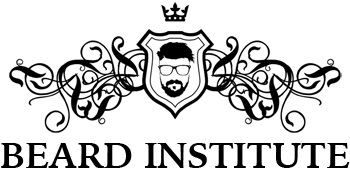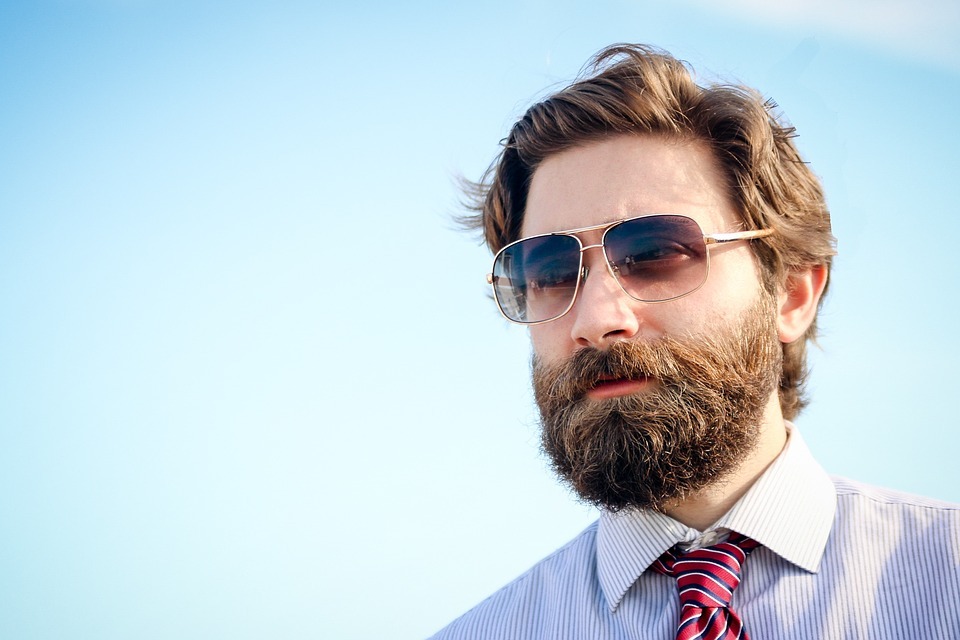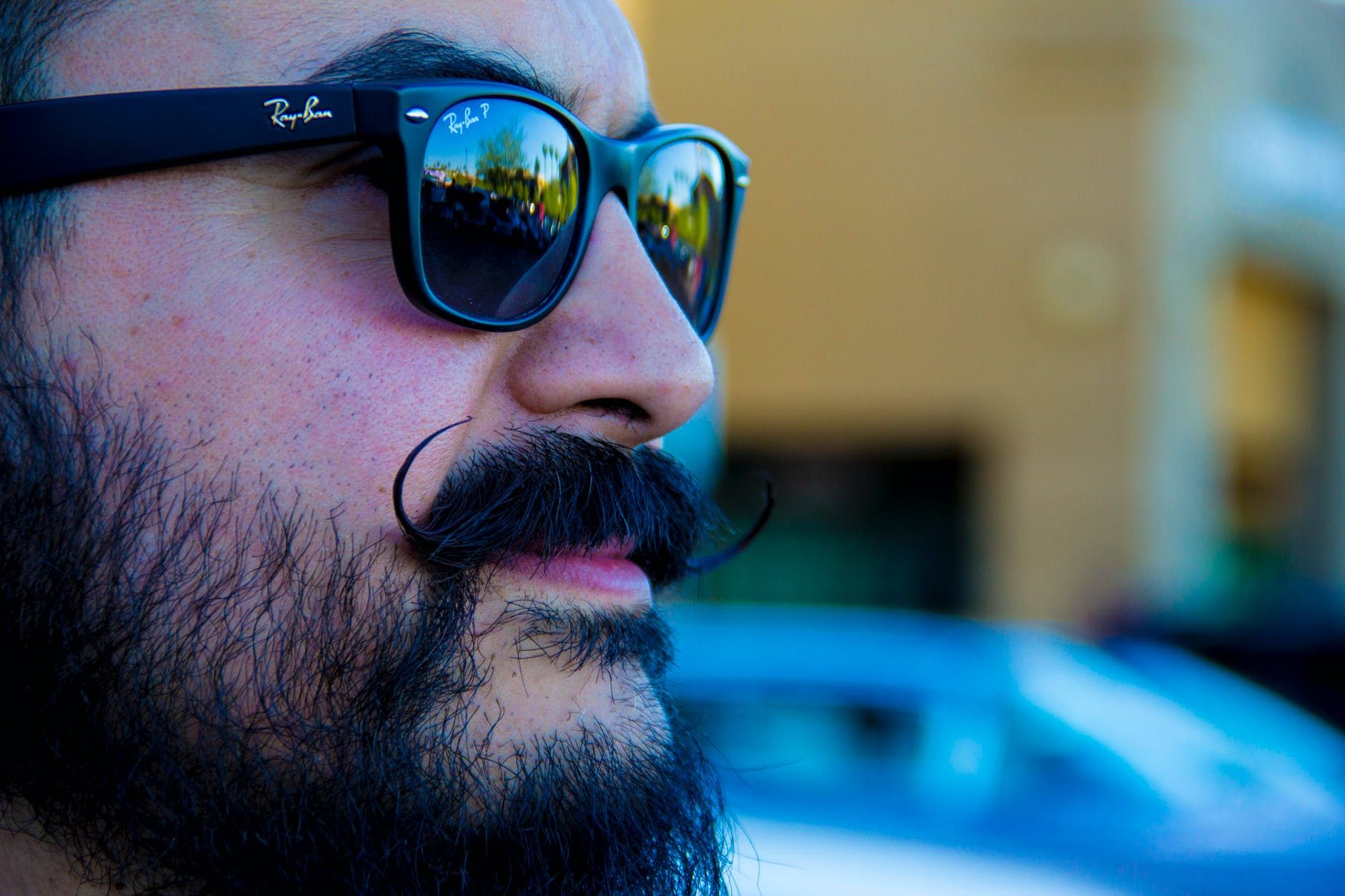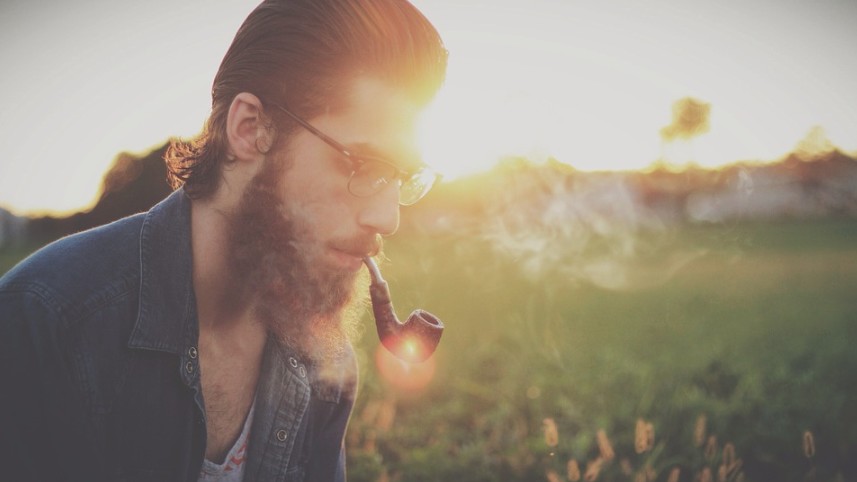What Does the Beard Symbolize?

A beard often symbolizes strength, masculinity, and wisdom in different cultures and historical contexts. It's linked to concepts of virility, social status, and divine power. Ancient Egyptians viewed beards as a sign of divine wisdom, while Greeks associated them with maturity and intelligence. In Islamic culture, a full beard can denote religious devotion. Modern views see beards as a form of personal expression and rebellion. Beards also play a role in attraction, signaling maturity and social standing, often enhancing perceived masculinity. If you're curious about how grooming trends and psychological aspects influence perceptions, there's much more to investigate.
Beards and Masculinity
Masculinity often finds a potent symbol in the presence of a beard. As you navigate the world, you'll notice that bearded men frequently exude a sense of strength and dominance. This isn't coincidental; beards improve perceptions of aggressiveness and dominance, echoing the survival traits rooted in evolutionary biology. Just like a lion's mane signifies strength in the animal kingdom, a beard does the same for men, reinforcing cultural associations with masculinity and virility.
You may also observe how a beard can raise a man's social status. Bearded men are often viewed as more mature and authoritative, which can influence dynamics in both professional and personal settings. This perception of maturity and wisdom tied to facial hair can elevate a man's standing, making him seem more reliable and experienced.
Additionally, beard grooming plays a significant role in maintaining this symbol of masculinity. A well-groomed beard can enhance these perceptions, showcasing a man's attention to detail and personal care. By investing time in beard grooming, you not only uphold these societal ideals but also contribute to your comprehensive image of masculine strength and authority.
Historical Significance
Throughout history, beards have carried profound significance, symbolizing masculinity, power, and virility. In ancient Egyptian culture, pharaohs were often depicted with long beards, representing their divine status and authority. This wasn't just a style choice but a powerful cultural symbol of rulership and strength. Likewise, in Mesopotamian history, warriors opted for short beards, reflecting a practical aspect of combat readiness while still maintaining an air of masculinity and power.
In Greek culture, beards took on a different connotation. Philosophers like Socrates and Aristotle were famously portrayed with beards, linking facial hair to wisdom and intellectual authority. This cultural association reinforced the idea that beards were more than just a physical trait—they were a symbol of profound thinking and philosophical power.
The Roman culture also saw shifts in beard symbolism. Initially, clean-shaven faces were preferred, but as times changed, bearded figures began to symbolize a new version of masculinity and societal roles. This shift highlighted how the meaning of beards could evolve, influenced by cultural and historical contexts. Across different periods, beards have consistently reflected deeper societal values and beliefs about power and masculinity.
Beards and Attraction
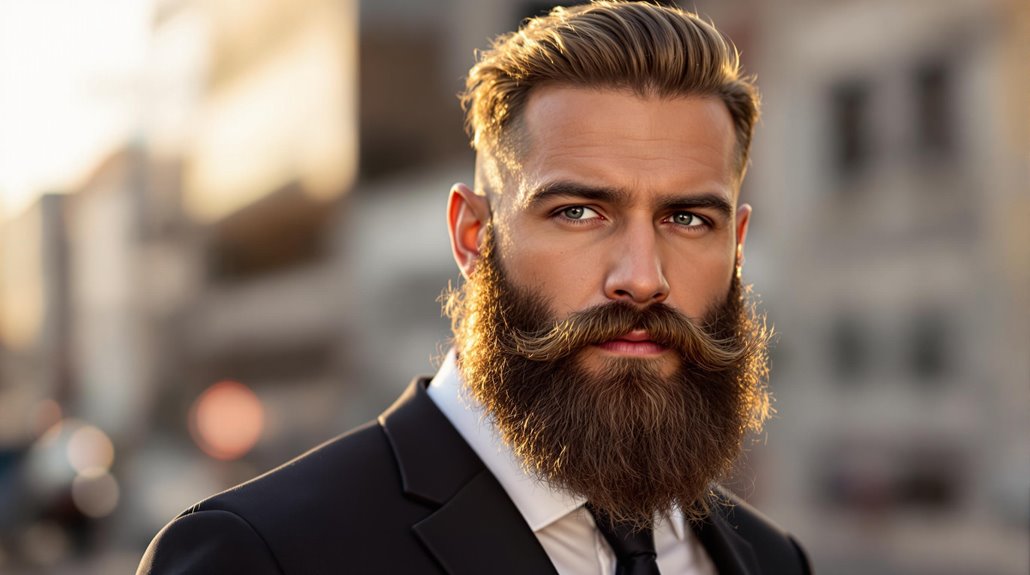
As history illustrates, beards have been powerful symbols of masculinity and authority. In terms of attraction, beards carry significant weight. They're not just facial hair; they're an emblem of maturity, dominance, and social status. Studies show that beards as a symbol can signal health and genetic fitness, making them alluring to potential mates. Here's what a beard says about a man's attractiveness:
- Maturity and Status: A beard often indicates a level of maturity and social standing that appeals to many.
- Short-term vs. Long-term Appeal: Women generally favor heavier stubble for short-term flings, while well-groomed beards are preferred for long-term relationships and as father figures.
- Enhanced Masculinity: Facial hair amplifies perceived masculinity and strength, traits linked to evolutionary survival and reproductive success.
- Attention from Women: Research indicates that men with beards tend to attract more attention from women compared to their clean-shaven counterparts.
- Grooming Importance: A well-groomed beard reflects personal care and attention to detail, enhancing its attractiveness.
Understanding what your beard says about you can be a game-changer. A well-maintained beard not only elevates your confidence but also your appeal, making you stand out in the crowd.
Cultural Perspectives
Across diverse cultures, beards have held profound symbolism, often embodying wisdom, experience, and authority. In ancient times, the beard is a sign of high status, as seen in the long beards of Egyptian pharaohs, which represented power and divine connection. Meanwhile, in Mesopotamia, warriors favored short beards for practicality, illustrating how cultural traditions shaped beard styles to reflect societal roles.
In Islamic culture, a full beard is a sign of religious devotion and faith, connecting men to their spiritual beliefs and adherence to religious teachings. This tradition underscores the beard's role as a marker of identity and commitment across different cultures. Likewise, many societies have long linked beards to masculinity and virility, with distinct styles conveying varied social statuses and identities.
In contemporary Western contexts, the meaning of the beard evolves, shifting towards individual expression and rebellion. This change mirrors broader societal shifts in norms surrounding masculinity and personal grooming. Here, a full beard might symbolize a break from traditional expectations, embracing a more personalized approach to identity. By understanding these cultural perspectives, you appreciate how beards continue to shape and reflect societal values worldwide.
Symbol of Wisdom

While beards have long been a symbol of wisdom, they also serve as markers of knowledge and experience across diverse cultures. From ancient Egypt to Greece, facial hair has been linked to intelligence and maturity. Philosophers like Socrates and Aristotle are often depicted with beards, signifying their intellectual prowess. In many societies, beards make you look more experienced and credible than a clean-shaven man, often promoting you to a higher social status.
Consider the following:
- Philosophers and intellectuals: Beards are frequently associated with thinkers and scholars, reinforcing the image of wisdom.
- Ancient Egypt: Beards represented divine wisdom and were reserved for pharaohs, symbolizing their connection to the gods.
- Greek tradition: Bearded individuals were seen as more mature and intelligent, often regarded as leaders in thought.
- Perception of maturity: Studies show that bearded individuals are perceived as older, suggesting greater life experience and knowledge.
- Modern views: Today, beards are still a symbol of wisdom, with many professionals believing growing a beard improves their credibility and expertise.
Ultimately, beards continue to signify wisdom across different cultures and periods, highlighting their enduring role as symbols of knowledge and authority.
Style and Expression
Beards don't just symbolize wisdom; they also allow for personal expression and style. Adopting diverse beard styles lets you showcase your individuality and lifestyle choices. A full beard can convey confidence and ruggedness, while a corporate beard might suggest professionalism. Each style carries its own unique flair and can reflect different facets of your personality. Choosing among a goatee and stubble can be more than a grooming decision—it's a statement about your character and how you wish to be perceived.
Historically, beards have been markers of masculinity, social status, and identity. Today, their significance has evolved. Modern beard culture celebrates personal expression, with grooming choices reflecting a broader societal shift towards valuing individuality. Regardless of whether you're sporting a laid-back stubble or a daring goatee, your beard tells a story. It speaks of creativity, rebellion, or even a laid-back attitude, impacting how others perceive you.
Ultimately, your beard is an extension of yourself. It's a canvas for self-expression, allowing you to experiment with different looks and adopt your unique style. By selecting the right beard style, you can project the image you desire and highlight your distinct sense of masculinity.
Beard Grooming Trends
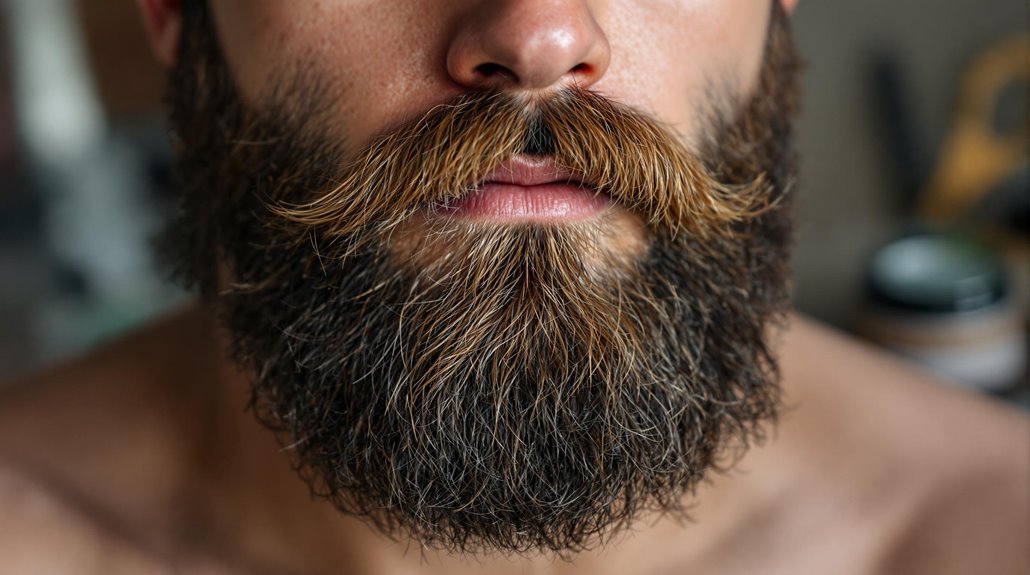
How have beard grooming trends transformed in recent years? You've likely noticed a surge in beard care with a focus on maintaining not just any facial hair, but a healthy and stylish beard. The rise in popularity of grooming products like oils, balms, and specialized tools has made it easier for you to achieve popular beard styles. Social media plays a huge role in this transformation, with influencers showcasing their grooming routines and recommending products that help refine your look.
Here's a quick look at how these trends have evolved:
- Product Necessities: Oils and balms are now staple items for beard care, enhancing softness and shine.
- Social Influence: Platforms like Instagram and TikTok shape beard styles and introduce new grooming techniques.
- Professional Services: Barbershops now offer specialized beard services such as trims and shaping.
- Competitions: Beard competitions promote creativity, encouraging experimentation with unique styles.
- Health Focus: Regular grooming improves not just appearance but also beard health and hygiene.
Evolutionary Aspects
Throughout history, humanity's fascination with beards has been more than just a fleeting trend; it's rooted in evolutionary biology. You see, beards might have evolved as a signal of maturity and genetic fitness. They can improve a man's standing among peers and attract potential mates. This isn't just speculation—studies suggest that testosterone levels influence facial hair growth. With higher testosterone, you're likely to have a fuller, thicker beard. This can be a sign of social dominance and competitiveness, traits that may have offered an evolutionary advantage when it came to mating opportunities.
From an evolutionary standpoint, beards are more than facial hair; they're a form of sexual selection. They indicate traits that were historically desirable for reproductive success. Research shows that beards can improve perceptions of masculinity and aggression, increasing overall attractiveness in social and mating contexts. So, when you see a man sporting a beard, you're not just looking at a grooming choice. You're witnessing an evolutionary story—a symbol of testosterone-driven maturity and an ancient cue for mating readiness. Beards, in this light, are powerful symbols woven into the fabric of human evolution, shaping perceptions and interactions for centuries.
Health and Hygiene
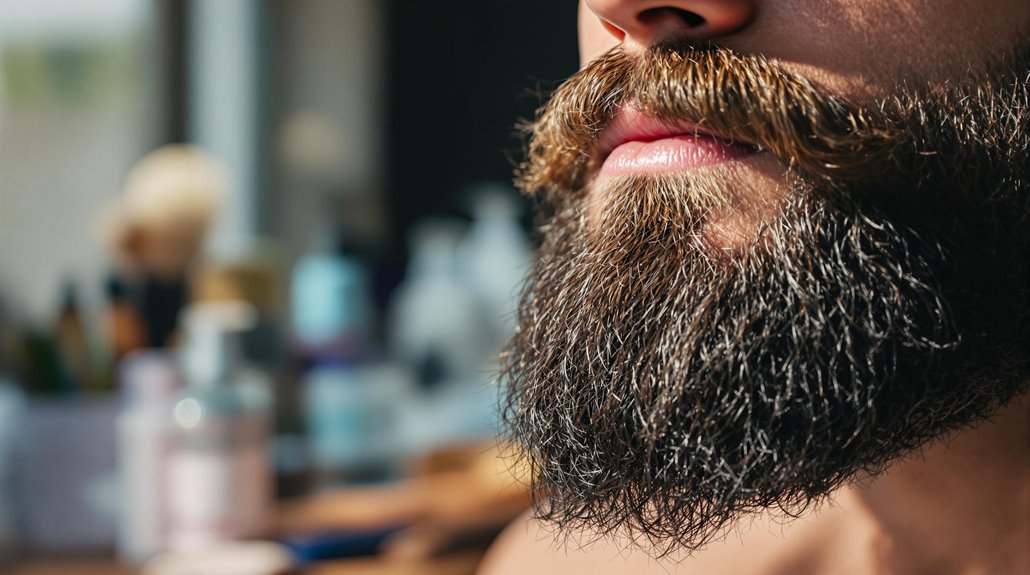
In conjunction with their evolutionary significance, well-groomed beards reflect a man's commitment to health and hygiene. When you maintain your beard, you're not just focusing on aesthetics; you're embracing a lifestyle that prioritizes self-care. Regular grooming routines, like washing and conditioning, improve the health and appearance of your facial hair, guaranteeing it looks its best.
Using premium beard care products, such as oils and balms, is crucial. Not only do they improve your beard's appearance, but they also nourish and maintain its quality, promoting healthier growth. These products play a critical role in keeping your beard soft and manageable.
Studies suggest that beards can trap moisture, which helps prevent skin dryness and irritation. This contributes to better skin health beneath the hair. Clean and well-maintained beards can also reduce exposure to allergens and bacteria, potentially improving comprehensive skin health and hygiene.
Here's how you can keep your beard in top condition:
- Wash and condition regularly to maintain cleanliness.
- Use premium oils and balms for nourishment.
- Trim and shape to guarantee neatness.
- Be mindful of allergens and bacteria.
- Moisturize to prevent skin dryness.
